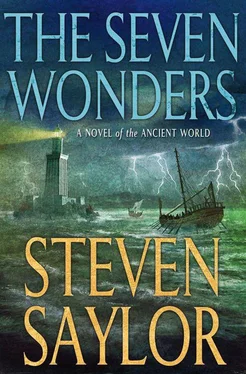Steven Saylor - The Seven Wonders
Здесь есть возможность читать онлайн «Steven Saylor - The Seven Wonders» весь текст электронной книги совершенно бесплатно (целиком полную версию без сокращений). В некоторых случаях можно слушать аудио, скачать через торрент в формате fb2 и присутствует краткое содержание. Год выпуска: 2012, Издательство: Macmillan, Жанр: Исторический детектив, на английском языке. Описание произведения, (предисловие) а так же отзывы посетителей доступны на портале библиотеки ЛибКат.
- Название:The Seven Wonders
- Автор:
- Издательство:Macmillan
- Жанр:
- Год:2012
- ISBN:нет данных
- Рейтинг книги:4 / 5. Голосов: 1
-
Избранное:Добавить в избранное
- Отзывы:
-
Ваша оценка:
- 80
- 1
- 2
- 3
- 4
- 5
The Seven Wonders: краткое содержание, описание и аннотация
Предлагаем к чтению аннотацию, описание, краткое содержание или предисловие (зависит от того, что написал сам автор книги «The Seven Wonders»). Если вы не нашли необходимую информацию о книге — напишите в комментариях, мы постараемся отыскать её.
The Seven Wonders — читать онлайн бесплатно полную книгу (весь текст) целиком
Ниже представлен текст книги, разбитый по страницам. Система сохранения места последней прочитанной страницы, позволяет с удобством читать онлайн бесплатно книгу «The Seven Wonders», без необходимости каждый раз заново искать на чём Вы остановились. Поставьте закладку, и сможете в любой момент перейти на страницу, на которой закончили чтение.
Интервал:
Закладка:
“Or perhaps not,” I said. “Look there, near the top, along that seam where two planks meet. From the grain of the wood, you can see there was a knothole in one of the boards, but it looks to me as though it’s been knocked out and widened by the use of some sharp instrument-you can see the scrapings of a chisel or some other tool on the wood, and here on the deck, directly below, there are traces of shavings and sawdust.”
“So there are. You have a keen eye, Gordianus.” Posidonius rose onto tiptoes and put his eye to the hole.
“What do you see?” said Antipater.
“It’s dark. I can’t be sure.” Posidonius stepped back. “Captain, did you and your men hear nothing last night?”
The captain was a grizzled seaman with a weathered face and an unkempt beard. He stank of wine. “Most of the men went ashore,” he said. “After that storm we sailed through, they wanted to feel solid ground beneath their feet. Those who stayed aboard bunked belowdecks, where it’s warmer. I slept like a dead man myself.”
“Helped by a generous amount of wine, no doubt,” said Posidonius.
The captain scowled. “We left it to your man to look after the crate. He seemed sober enough, and eager to do his job.”
Posidonius scowled. “Can someone remove the top of this crate?”
“I’ll do it myself,” said the captain. He fetched a crowbar and a wooden box to stand on.
“Careful!” cried Posidonius, as the man went to work. My teeth were set on edge by the shriek of nails being drawn from the wood.
At last the captain lifted the lid free and handed it down to two of his sailors. He stepped down from the box.
Posidonius quickly took his place. He looked inside. He drew a sharp breath. His shoulders sagged.
“What is it?” said Antipater.
“See for yourself,” said Posidonius. With my assistance, Antipater took his place on the box.
Antipater gasped. “By Hercules! What a disaster!”
I helped him down from the box. I stepped aside, deferring to Cleobulus and the Gauls, but all three kept their distance. Cleobulus looked especially anxious, I thought.
I stepped onto the box and peered down into the crate.
No one could fault the manner in which the statue had been packed. The crate was well proportioned, and folds of soft cloth had been tied around the statue to cushion it. These concealed the details of the statue, but its general shape could be perceived, and it was obvious at once that the head was missing-or rather, destroyed, for plaster fragments and bits of dust that had once constituted the head lay scattered amid the packing and on the bottom of the crate.
I stepped down. Reluctantly, or so it seemed to me, the others finally took their turns, starting with Cleobulus, whose face was ashen when he ceded his place to Gatamandix. The Druid merely grunted at the sight of the defaced statue and showed no emotion. Vindovix was so tall he did not need the box to look inside. He stood on tiptoes and peered over the edge. He clenched his jaw. His face turned bright red and his pale blue eyes glittered with tears.
“What am I to make of this?” said Posidonius. “Zenas is gone, and the part of the statue most vital to our inquiry-the head-has been destroyed. Deliberately destroyed, I think we can safely say. The knothole already in the wood was bored and chipped away until a staff of some kind could be pushed through-an iron stave, perhaps-and used to smash the head. Given the deliberate and determined nature of this act, I suspect premeditation. Someone must have known the knothole was there, at a height corresponding exactly to the statue’s head. The person who did this must have been present when the crate was constructed; indeed, that person may have seen to it that this particular plank, with its convenient knothole, was placed just so, in order to provide an easy way to commit this act of destruction.”
The whole time he spoke, Posidonius stared at Cleobulus, who turned even paler.
“Teacher, surely suspicion should fall first on Zenas,” he said. “Why is the slave not here? Why did he abandon his post?”
“If Zenas played some part in this, it was only because someone put him up to it,” said Posidonius, continuing to stare at Cleobulus. “But I can’t believe Zenas would betray my trust, especially in a matter as serious as this. The fact that he isn’t here, and that his writing instruments were left behind, suggests to me that some harm was done to the poor fellow.”
Cleobulus swallowed hard. “Then where is he?”
Posidonius at last took his eyes off his pupil. He turned and looked over the ship’s side.
“Teacher, if the slave were thrown overboard, his body would have washed against the piers by now,” said Cleobulus. “Someone would have seen it-”
“Not if his body was tied to the iron stave that was used to smash the statue’s head,” said Posidonius, gazing intently at the water below, as if by sheer will he could make the waves give up their secret.
“But this is terrible!” said Antipater. “Is there not some other explanation for what’s happened, short of accusing someone of murder and wanton destruction? Perhaps Zenas will turn up yet. Have you never had a slave go missing, Posidonius, and then reappear shamefaced a day later, stinking of wine and the brothel?”
“Not Zenas,” Posidonius said. “And what possible motive could he have had to destroy the statue’s head? What motive could anyone have to do such a thing?”
To this, no one gave an answer. Cleobulus, still pale but with a glint of defiance in his eyes, stared back at his teacher for a long moment, then brusquely took his leave and hurried off.
After arranging with the captain to have the damaged statue transported to his house, Posidonius told us he wished to be alone, and headed off by himself. The Gauls went off on their own, with Gatamandix gripping Vindovix’s shoulder, as if to comfort him. I saw them duck into a seedy-looking tavern on the waterfront. I was left with Antipater, who expressed his desire to head directly back to the house of Posidonius.
As we walked away from the harbor, I looked over my shoulder, past the ship to the distant ruins of the Colossus at the end of the long mole. The huge fragments of bronze gleamed dully beneath the iron-gray sky. Beyond the Colossus, dark clouds were gathering over the open sea.
* * *
It was a gloomy day in the house of Posidonius.
The Gauls remained absent, as did Cleobulus. Our host at last returned, but shut himself up in his study. Eventually the carters arrived with the crate. Without enthusiasm, Posidonius emerged from his seclusion to oversee the unpacking.
Soon the plaster statue stood in a room off the garden. Even without its head, the remains presented a fascinating image, showing how the Colossus must have appeared when it stood intact beside the harbor. If the living model had been a Greek, this statue surely would have been larger than life, but its oversized proportions were correct for a hulking Gaul, and the muscular physique could easily be taken for a reproduction of Vindovix, or of an ancestor whom he resembled.
“Perhaps the head could be reconstructed,” said Antipater hopefully, but when we sifted through the bits and pieces, the only recognizable fragments were some broken sunbeams from Helios’s crown.
Without a word, Posidonius returned to his library, but emerged a moment later.
“Have either of you entered my library today?” he asked.
Antipater shook his head, as did I.
“Very odd,” said Posidonius. “I’m certain, before we headed for the ship this morning, that Gatamandix’s knife was on the small table where I left it. But it isn’t there now.”
“Perhaps Gatamandix took it with him before we left this morning,” suggested Antipater.
Читать дальшеИнтервал:
Закладка:
Похожие книги на «The Seven Wonders»
Представляем Вашему вниманию похожие книги на «The Seven Wonders» списком для выбора. Мы отобрали схожую по названию и смыслу литературу в надежде предоставить читателям больше вариантов отыскать новые, интересные, ещё непрочитанные произведения.
Обсуждение, отзывы о книге «The Seven Wonders» и просто собственные мнения читателей. Оставьте ваши комментарии, напишите, что Вы думаете о произведении, его смысле или главных героях. Укажите что конкретно понравилось, а что нет, и почему Вы так считаете.










